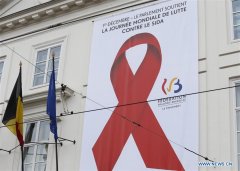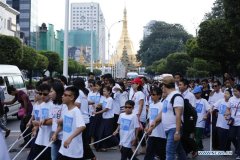UCLA launches high-tech "mobile stroke unit" to bring hospital to patients
LOS ANGELES, Oct. 28 (Xinhua) -- An academic medical center at the University of California, Los Angeles (UCLA) has launched the first "mobile stroke unit" (MSU) on the West Coast of the United States this week to bring the hospital to the patient, potentially leading to higher survival rates and better outcomes for patients.
"With the UCLA Health Mobile Stroke Unit, we are bringing the hospital to the patient instead of the patient to the hospital, in order to save as much brain as possible," Dr. Jeffrey Saver, director of the UCLA Comprehensive Stroke Center, was quoted as saying in a news release.
According to the U.S. Centers for Disease Control and Prevention (CDC), someone in the United States suffers a stroke every 40 seconds. Every 4 minutes, someone dies of a stroke. Strokes kill about 140,000 Americans each year, which is 1 out of every 20 deaths.
When treating stroke victims, every second counts. But in large cities, dense traffic can make it difficult to get a patient to the emergency room in a timely manner, and in rural areas, specialized care can be miles away.
"Rapid response is critical, because the sooner a stroke is treated, the better the patient's outcome," said Dr. May Nour, medical director of the UCLA Arline and Henry Gluck Stroke Rescue Program. "We know from research at UCLA that in a typical stroke, every minute that goes by without treatment, 2 million brain cells die."
So UCLA Health is testing MSU to help medical personnel start treatment in the field, allowing doctors to make a diagnosis, administer medication and even conduct Computed Tomography (CT) scans before arriving at the hospital.
The high-tech vehicle is a unique type of ambulance equipped with a mobile CT scanner, which allows doctors to diagnose and treat strokes in the field with appropriate medications. Within the unit are a mobile blood-testing laboratory, as well as a neurologist, critical care nurse, CT technologist and paramedic.
In the initial phase of the pilot program, a neurologist specializing in stroke treatment will be riding in the unit. As the program develops, a neurologist will oversee care more efficiently via a live video and voice connection from Ronald Reagan UCLA Medical Center, according to UCLA.
The use of specially equipped ambulances has begun to spread across the United States. The first U.S. MSU launched in Houston in early 2014, following the world's first in Berlin, which began running in early 2011. So far, about ten other U.S. MSUs are in operation, with most of them having been put into service during the past 15 months.
The UCLA unit is the first such unit to operate in California. It is now part of a U.S. national study to test the value of starting stroke care in the field.
"When stroke victims are not treated quickly, they are more likely to need a lifetime of costly care," said Nour. "If we are able to treat and improve outcomes for 25 patients over a 5-year period, we will break even on the cost of the mobile stroke unit."















